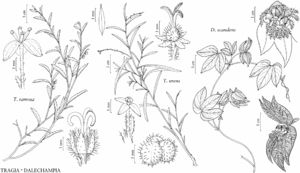Tragia ramosa
Ann. Lyceum Nat. Hist. New York 2: 245. 1827.
Subshrubs, 1.2–5 dm. Stems erect to trailing, dark green to light green, apex rarely flexuous. Leaves: petiole 2–20 mm; blade linear-lanceolate to narrowly ovate, 1–4 × 0.5–2 cm, base truncate to weakly cordate, margins serrate, apex acute. Inflorescences terminal (often appearing leaf-opposed), glands few, sessile, staminate flowers 2–20 per raceme; staminate bracts 1.5–2 mm. Pedicels: staminate 0.7–2 mm, persistent base 0.4–1.5 mm; pistillate 2–2.5 mm in fruit. Staminate flowers: sepals 3–4, green, 1–2.2 mm; stamens 3–6 (–10), filaments 0.3–1 mm. Pistillate flowers: sepals lanceolate, 0.8–2.5 mm; styles connate 1/3–1/2 length, long-exserted; stigmas smooth to undulate. Capsules 6–8 mm wide. Seeds dark-brown, 2.5–3.5 mm. 2n = 44.
Phenology: Flowering spring–fall; fruiting late spring–fall.
Habitat: Mesquite, desert scrub, pine-juniper, oak woodlands.
Elevation: 200–2800 m.
Distribution
Ariz., Ark., Calif., Colo., Kans., Mo., Nebr., Nev., N.Mex., Tex., Utah, Mexico (Baja California), Mexico (Chihuahua), Mexico (Coahuila), Mexico (Nuevo León), Mexico (Sonora), Mexico (Tamaulipas)
Discussion
Tragia ramosa is a variable species showing much environmental plasticity. Collections from the western United States and western Mexico have much broader leaves than those from Texas and Nuevo León, and were previously referred to as T. stylaris. Smooth stigmatic surfaces, three to six (rarely to ten) stamens, and narrow apical leaves are characters consistent with T. ramosa.
Selected References
None.
Lower Taxa
"elongated" is not a number."connate" is not a number. "distinct" is not a number."/3" is not declared as a valid unit of measurement for this property. "/2" is not declared as a valid unit of measurement for this property.
